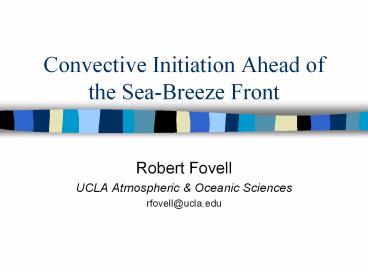Convective Initiation Ahead of the Sea-Breeze Front - PowerPoint PPT Presentation
1 / 66
Title:
Convective Initiation Ahead of the Sea-Breeze Front
Description:
Convective Initiation Ahead of the Sea-Breeze Front Robert Fovell UCLA Atmospheric & Oceanic Sciences rfovell_at_ucla.edu – PowerPoint PPT presentation
Number of Views:183
Avg rating:3.0/5.0
Title: Convective Initiation Ahead of the Sea-Breeze Front
1
Convective Initiation Ahead of the Sea-Breeze
Front
- Robert Fovell
- UCLA Atmospheric Oceanic Sciences
- rfovell_at_ucla.edu
2
Overview
- Sea-breeze circulation (SBC) and Horizontal
Convective Rolls (HCRs) - Interaction leading to convective initiation
- 3D idealized cloud model
- pseudo-Florida
- no Coriolis, 2nd coast, inland water, coastline
variations, topography or precip development - resolution 500 m horizontal, 150 m vertical
3
(No Transcript)
4
Horizontal Convective Rolls (HCRs)
5
(No Transcript)
6
(No Transcript)
7
(No Transcript)
8
Convective initiation
- Three simulations (Fovell Dailey 2001)
- Roll only run
- Sea-breeze only (SBO) run
- Control run (with SBC and HCRs)
- Only the Control run possessed deep convection
- Convection initiated ahead of SBF
9
(No Transcript)
10
Control run
11
Items of interest
- Roll spawns deep convection as SBF approaches
- SBF cloud becomes suppressed at first
- Propagation speed increases by 60
- SBF itself spawns deep convection prior to roll
contact - Two vigorous updrafts - single cloud shield
- Brief yet strong downdraft appears in between
- Dramatic slowing of SBF during this time
12
(No Transcript)
13
Effect of latent heating on SBF propagation
Suppression of SBF cloud results in propagation
speed increase
14
Hypothesis for roll cloud formation
- SBC substantially modifies upstream environment
(over land) - midtropospheric moistening
- horizontal flow perpendicular to SBF/coast
- necessary, but not sufficient
- Rolls provide the spark
- moist plumes above roll updrafts
- obstacle effect gravity waves
15
SBC influence on inland environment
Highlighted trajectory 0.025 m/s (60 km inland
from coast)
16
(No Transcript)
17
SBO run
18
Conditions ahead of SBF
19
Conditions ahead of SBF
20
SBO run
Black contours 0.5 g/kg cloud water isolines
21
Analysis
- Control, SBO runs similar until deep convection
onset - Control run fields
- SBO run fields
- Difference fields
- Isolate effect of rolls on SBC
22
(No Transcript)
23
(No Transcript)
24
roll cloud
25
(No Transcript)
26
(No Transcript)
27
(No Transcript)
28
(No Transcript)
29
(No Transcript)
30
(No Transcript)
31
Where did the roll cloud air come from?
32
(No Transcript)
33
0.1 g/kg
34
(No Transcript)
35
Suppression and reintensification of the SBF
updraft/cloud
- Use small moisture blob to mimic roll cloud in
SBO run - Two gravity waves excited in response
- Deep subsidence responds to latent heating in
roll cloud - Shallower mode starting as adiabatic cooling
beneath the roll cloud - First wave suppresses SBF cloud, second
reinvigorates it - Dynamical effect of shear?
36
A quick gravity wave primer
New convective heating
37
A quick gravity wave primer
New convective heating
Initial environmental response
38
A quick gravity wave primer
39
A quick gravity wave primer
40
A quick gravity wave primer
Nicholls et al. 1991 Mapes 1993 Fovell 2002
41
A quick gravity wave primer
42
A quick gravity wave primer
43
(No Transcript)
44
Analysis
- Analysis will employ
- Original SBO run fields
- Modified SBO run fields MSBO
- Difference fields
- Isolate effect of roll cloud on SBF cloud
45
Colored field vertical velocity
46
(No Transcript)
47
Colored field MSBO-SBO temperature difference
48
White contour cloud water difference
49
Contoured MSBO vertical velocity
50
Colored field water vapor difference
51
(No Transcript)
52
Arrows horizontal velocity difference
53
(No Transcript)
54
Summary
- Deep convection occurs only in run having both
SBC and HCRs - Roll convection excited prior to SBF-HCR merger
- SBC upstream effects necessary, not sufficient to
support deep convection - Roll-associated moist plume, obstacle-effect
gravity waves provide spark - Once established, roll convection modulated SBF
convection through additional gravity waves
55
(No Transcript)
56
(No Transcript)
57
(No Transcript)
58
(No Transcript)
59
(No Transcript)
60
(No Transcript)
61
(No Transcript)
62
(No Transcript)
63
(No Transcript)
64
(No Transcript)
65
Dailey and Fovell (1999)
66
(No Transcript)































